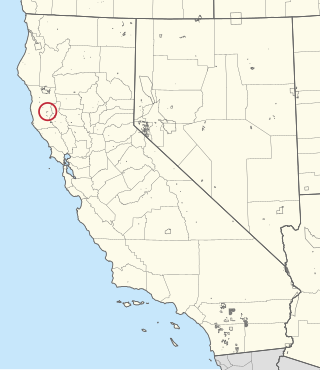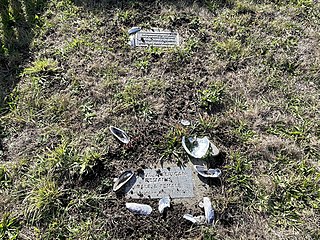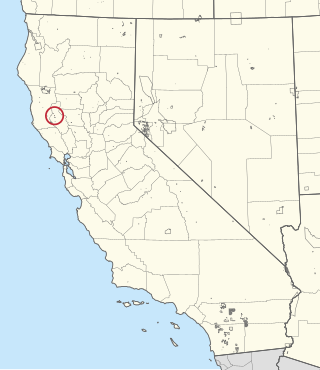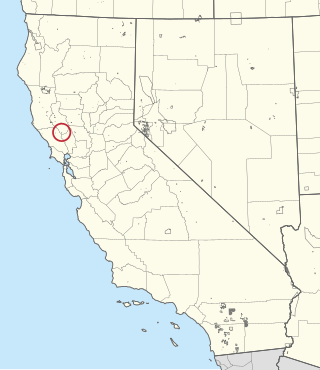Related Research Articles
The Federated Indians of Graton Rancheria, formerly known as the Federated Coast Miwok, is a federally recognized American Indian tribe of Coast Miwok and Southern Pomo Indians. The tribe was officially restored to federal recognition in 2000 by the U.S. government pursuant to the Graton Rancheria Restoration Act.
The Lytton Band of Pomo Indians is a federally recognized tribe of Pomo Native Americans. They were recognized in the late 1980s, as lineal descendants of the two families who lived at the Lytton Rancheria in Healdsburg, California from 1937 to about 1960. The tribe now has around 275 enrolled members. It has a casino in San Pablo, California, and has proposed to build housing for tribe members, plus a winery and a hotel, just west of Windsor, California, in Sonoma County.

The Guidiville Rancheria of California are a federally recognized Pomo tribe located in Mendocino County, California.
The Hopland Band of Pomo Indians of the Hopland Rancheria is a federally recognized tribe of Pomo people in Mendocino County, California, south of Ukiah. The Hopland Band Pomos traditionally lived in the Sanel Valley.
The 70-acre (280,000 m2) Coyote Valley Reservation in Redwood Valley, California is home to about 170 members of the Coyote Valley tribe of the Native American Pomo people, who descend from the Shodakai Pomo. They are a federally recognized tribe, who were formerly known as the Coyote Valley Band of Pomo Indians of California.

The Redwood Valley Rancheria is a federally recognized Indian tribe located in Redwood Valley, Mendocino County, California. The tribe is primarily composed of Pomo Indians. Redwood Valley Rancheria is a sovereign Indian tribe with the powers of self-governance.

The Big Valley Band of Pomo Indians of the Big Valley Rancheria is a federally recognized tribe of Pomo and Pit River Indians, with a reservation located in Lake County, California, near the town of Finley. They conduct tribal business from Lakeport, California.
The Manchester Band of Pomo Indians of the Manchester Rancheria, formerly named the Manchester Band of Pomo Indians of the Manchester-Point Arena Rancheria, is a federally recognized tribe of Pomo Indians in California. The tribe is a community of Pomo Native Americans who are native to Northern California. The Bokeya society are enrolled in the Manchester Band of Pomo with the approval of their constitution and by-laws in 1936.

The Sherwood Valley Rancheria of Pomo Indians of California is a federally recognized tribe of Pomo Indians in California.

The Habematolel Pomo of Upper Lake is a federally recognized tribe of Pomo Indians in Lake County, California. The tribe's reservation, the Upper Lake Rancheria, is 119 acres (0.48 km2) large and located near the town of Upper Lake in northwestern California.

The Middletown Rancheria of Pomo Indians of California is a federally recognized tribe of Pomo Indians, as well as some Wappo and Lake Miwok Indians, in California, headquartered in Middletown, California.

The Robinson Rancheria of Pomo Indians of California is a federally recognized tribe of Eastern Pomo people in Lake County, California.

The Pinoleville Pomo Nation is a federally recognized tribe of Pomo people in Mendocino County, California. Leona Williams serves as Tribal Chairperson.
The Potter Valley Tribe is a federally recognized tribe of Pomo people in Mendocino County, California. They were previously known as the Little River Band of Pomo Indians and Potter Valley Rancheria of Pomo Indians of California. The tribe is descended from the first-known inhabitants of the valley, which the Pomo called Ba-lo Kai. Europeans first settled there, at the headwaters of the East Fork of the Russian River, in 1852.

The Dry Creek Rancheria Band of Pomo Indians is a federally recognized tribe of Pomo people, an indigenous people of California. It has a reservation near Geyserville, California, in Sonoma County, where it operates the River Rock Casino Resort.
The Koi Nation of the Lower Lake Rancheria is a federally recognized tribe of Southeastern Pomo people in northern California. Their name for their tribe is Koi Nation of Northern California, from their traditional village, Koi, once located on an island in Clear Lake.
The California Rancheria Termination Acts refer to three acts of Congress and an amendment passed in the 1950s and 1960s as part of the US Indian termination policy. The three Acts, passed in 1956, 1957, and 1958 targeted 41 Rancherias for termination. An additional seven were added via an amendment in 1964. Including three previous terminations, 46 of the 51 targeted Rancherias were successfully terminated. Through litigation and legislation, over 30 Rancherias have been restored and at least five are still working to be.
References
- 1 2 3 California Indians and Their Reservations. Archived 2009-03-11 at the Wayback Machine San Diego State University Library and Information Access. 2009 (retrieved 27 July 2009)
- ↑ Reynolds, Jerry. "Pombo rides again against off-reservation gaming." Indian Country Today. 10 September 2008 (retrieved 27 July 2009)
- ↑ Scotts Valley Band of Pomo Indians Fee-To-Trust and Gaming Development Project Environmental Impact Statement. (retrieved 27 July 2009)